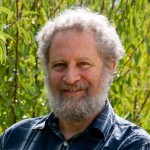April 28, 2017
Internationally noted ecophysiologist to present Elmer G. Heyne Crop Science Lecture May 2

Victor Sadras, internationally noted ecophysiologist with the Australian Research and Development Institute and Government of South Australia, will present at the 33rd annual Elmer G. Heyne Crop Science Lecture at 4 p.m. Tuesday, May 2, in 1018 Throckmorton Hall.
Sadras will present "We're in a Maze, not a Highway: There is Nowhere That Speed Alone Can Take Us." Refreshments will be served at 3:30 p.m. in the lobby of Throckmorton Hall. The lecture is open to the public.
Sadras also will present a technical seminar at 10:30 a.m., Wednesday, May 3, in 2002 Throckmorton Hall. The seminar is titled "Shifts in the Phenotype of Australian Wheat in Response to Selection for Yield."
Sadras leads the crop ecophysiology team at the South Australian Research and Development Institute. Sadras has a doctorate from the University of Melbourne, and a master's degree in agricultural engineering from the Universidad de Buenos Aires. Sadras is co-editor in chief of Field Crops Research, since 2013; associate editor of Crop and Pasture Science, since 2009; and a member of the editorial boards of Irrigation Science, since 2009; European Journal of Agronomy, 2009-2015; and Field Crops Research, 1998-2012.
He has published more than 170 papers in ISI journals and is the co-editor of "Crop Physiology: Applications for Genetic Improvement and Agronomy," published by Academic Press. He is the lead author of FAO Water Report 41, "Yield gap analysis of rainfed and irrigated crops," and contributed to FAO Irrigation and Drainage Paper 66 "Crop yield response to water."
Sadras has worked in agriculture since 1982. His research interest is the agronomic and genetic adaptation of crops to environmental stresses, including water deficit, extreme temperatures, nutrient deficit, soil physical and chemical constraints — e.g. compaction and salinity — pathogens and insects. He has measured and modeled aspects of the water, carbon and nitrogen economies of annual — wheat, oat, chickpea, pea, sunflower, maize, soybean and cotton — and perennial crops — grapevine and olive — in rainfed and irrigated systems of Australia, Argentina and China.
Sadras' main scientific contribution is his work on the most advanced conceptual model of grain yield in annual species. This model re-interprets the yield physiology of the crop and has influenced breeders, agronomists and crop scientists worldwide.
